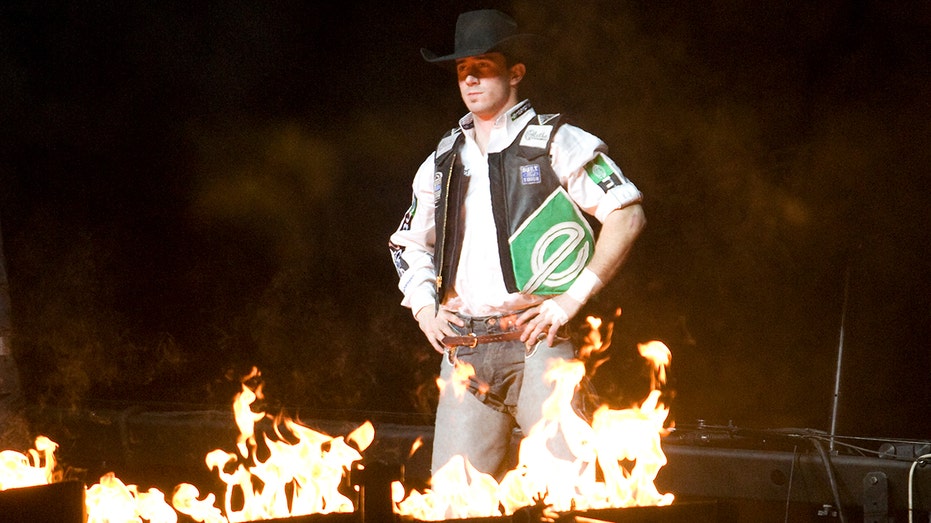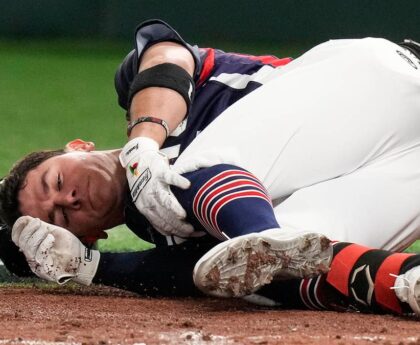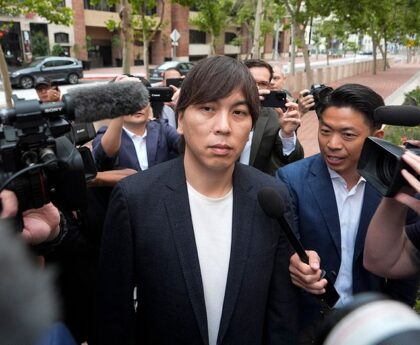Kody Lostroh knows a thing or two about competing in what is often referred to as “the most dangerous eight seconds in sports.”
The former professional bull rider saw a lot of success during his years competing. In 2009, he was the Professional Bull Riding (PBR) world champion, and in 2024, Lostroh was inducted into the Bull Riding Hall of Fame.
Since his retirement from bull riding, Lostroh has still been involved in the sport, now taking on the role of coach. He is currently the head coach of the New York Mavericks, a team making its debut in the PBR this season.
THE BASICS OF BULL RIDING: A LOOK INTO THE ‘MOST DANGEROUS 8 SECONDS IN SPORTS’
Lostroh spoke with Fox News Digital in a Zoom interview about how the concept of teams has affected the PBR, and he gave insight on the training involved in being a bull rider.
“The PBR teams is a pretty new concept that just started. We’re in our third season,” Lostroh told Fox News Digital.
Since its inception in 1992, the PBR has focused on individual bull riders. In 2022, the team element was added to the sport, providing a new factor that has proven exciting for fans around the country.
“This team sport was launched just to give people another option to get involved as fans,” Lostroh said. “Now, it’s a five-on-five head-to-head match between one team and another. So, five guys will ride from one team, five from the other team, back and forth, and the team with the highest cumulative score wins.”
“It’s an interesting concept, but at the end of the day, it’s still man versus beast, and the guy’s got to do his job, but now you’ve got a teammate relying on you as well,” Lostroh added.
‘LAST COWBOY STANDING’: BEHIND-THE-SCENES FOOTAGE SHOWS GRUELING PHYSICAL TOLL ON BULL RIDERS
As far as the rules go for team bull riding events and individual ones, fans can expect the same to apply.
“Eight seconds on the bull, 50 points for how hard the bull bucks and 50 points for how well the rider rides,” Lostroh said.
That said, fans can anticipate a little bit of a different atmosphere at these team events.
“The rules of bull riding are still the same, just the format is a little bit different, but it gets pretty intense,” he said.
With teams introduced, Lostroh said fans really get engaged with the team they’re supporting and that there’s a lot of excitement at events from those in the stands, which directly affects the riders and “drives the sport.”
Training for a sport like this is different from any other. According to Lostroh, it takes an athlete to ride about 100 bulls just to get acquainted with what’s going on around them as they ride.
“The first time getting on a bull, I can only speak from my own experience, but it’s chaos. Things happen fast. You typically black out. You don’t know where the bull went, what you did, what went wrong, what went right. But eventually, that starts to slow down,” Lostroh said.
While some have the first-timers’ approach of hopping on and hoping for the best, Lostroh said this isn’t the most effective way to learn. Rather, it’s frequently riding horses bareback before getting on a bull in order to familiarize yourself with the feeling of an animal beneath you.
When it comes time to train in a professional setting, the way each team, each rider prepares is going to look a bit different.
“The training in the bull riding world can vary greatly depending on who’s doing it, but the days of just old cowboys drinking beer and having a big party all the time and then riding bulls is over,” Lostroh said.
He added that riders are actively caring for themselves by eating clean, working out and training, not only for riding but for the mental aspect of it, too.
“You’re not going to see guys training to get big and bulky and be super strong because it doesn’t matter how strong you get, you’ll never be stronger than a bull,” Lostroh said. “So, we’ve got to rely on the things we are good at. We can be quicker, faster, more reactive.”
BULL RIDING BRINGS FRESH SPORT TO NYC: MATT WEST
Bull riders do have time to prepare on practice bulls outside competition, but factors like a rider’s age, for example, play into how often they are riding bulls for practice.
“Typically, most guys ride better the more bulls [that] they’re getting on. So, practice bulls during the week, whether it’s one, two, three, whatever it takes for each guy to be at his best,” said Lostroh.
“Some need a few more than others, so that’s typically a weekly thing. But also, some of the older guys that have been injured – and our main focus is keeping them healthy – they might not see quite as many practice bulls,” he added.
When event days come around, Lostroh said bull riders are ideally functioning on autopilot, relying on all the work they’ve put into training.
“Ideally, in the bucking chute, we’re not feeling or thinking anything,” he said. “We trust our training, trust our instincts and go for it.”
Even though that’s how things go in a perfect scenario, the sport is very unpredictable and dangerous, so things don’t always go according to plan.
“Sometimes, when things are going bad, when you’re struggling in a ride, it seems like the longest, hardest thing you’ve ever done in your life,” he said before noting that a win makes it all worth it.
Lostroh and assistant coach Ednei Caminhas are preparing the New York Mavericks for their PBR debut on Aug. 9-10 at Barclays Center in Brooklyn.
All of Lostroh’s years of riding have allowed him to share everything he’s learned with current riders to help contribute to their success. He not only hones in on the physical skills needed to ride a bull, but also the mental toughness, which is just as important.
“There’s a lot of unknown in this sport because it is just you and the bull, and the bull changes every time,” Lostroh said. “The skills they can learn and be good at, but that six-inch space between your ears is what determines the winners from the losers.”
Article Source: Sports From Fox News Read More




